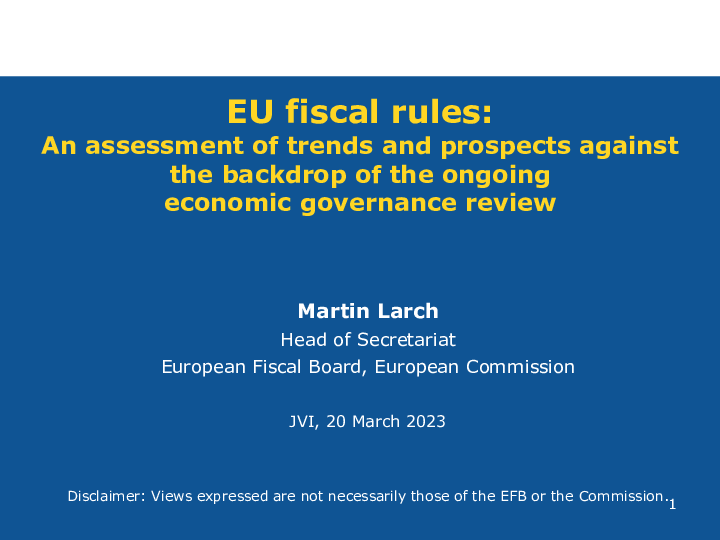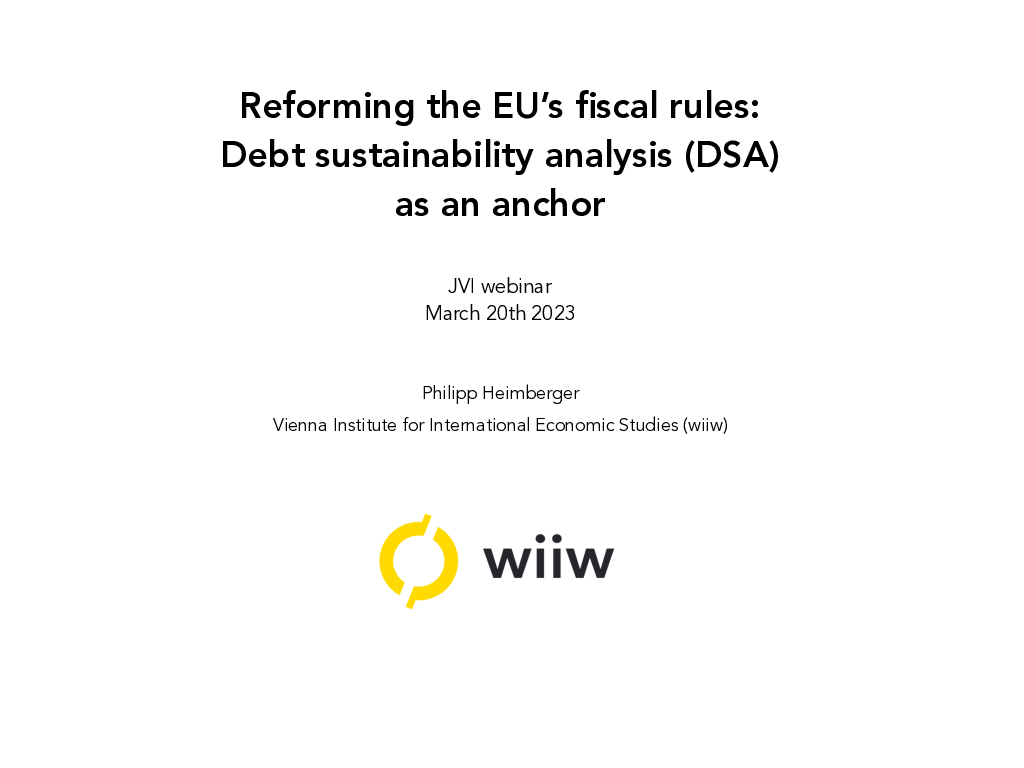EU fiscal rules: An assessment of trends and prospects against the backdrop of the ongoing economic governance review
Monday, March 20, 2023, at 11:00-12:30 Vienna time (CET)
Presenter
• Martin Larch, Head of Secretariat, European Fiscal Board
Discussant
• Philipp Heimberger, Economist, Vienna Institute for International Economic Studies (wiiw)
Moderator
• Markus Eller, Senior Economist, Joint Vienna Institute
On March 20, 2023, the Joint Vienna Institute (JVI) hosted a webinar to discuss the European Union’s fiscal rules, recent reform proposals, and the way forward. The webinar featured presentations by Martin Larch, Head of Secretariat at the European Fiscal Board, based among others on his recent assessment paper, and Philipp Heimberger, Economist at the Vienna Institute for International Economic Studies (wiiw), based among others on his statement at a hearing in the European Parliament, and was moderated by Markus Eller, Senior Economist at the JVI.
The EU’s fiscal rules have been a topic of discussion for the past three decades, particularly since the Maastricht criteria were introduced in the early days of the Economic and Monetary Union. The rules have been revised several times, but designing rules that ensure fiscal sustainability, allow for countercyclical fiscal policy, and are easy to monitor and adhere to has been challenging, also in view of a strongly changing macroeconomic environment in recent years. To tell it with the words of the European Commission’s Executive Vice-President Valdis Dombrovskis: “Much has changed since the Maastricht Treaty … EU countries now face significantly higher debt and deficit levels that vary widely. New challenges such as the green and digital transitions and energy supply issues will require us to make major reforms and investments for years to come.” (when presenting the EC’s reform orientations in November 2022).
Significant progress has been made in recent months towards a new EU economic governance framework that promises to be more effective than the current one, implying a regime shift – as asserted by the speakers. The most recent review of the EU’s economic governance framework began in early 2020, the European Commission presented its reform orientations in November 2022, and the ECOFIN Council agreed its reform orientations on March 14, 2023. If implemented, these orientations will imply more differentiated fiscal adjustment requirements across countries, anchored on debt sustainability analysis (DSA) and on a net primary expenditure rule, and will build in incentives for structural reforms and government investment. Stronger enforcement, including possibly reputational sanctions, are expected to ensure compliance.
However, while views have converged recently and agreement on the principles seems within reach, several aspects of the new system are still to be discussed, including technical features that are not yet sufficiently specified. For example, the calculation of the net expenditure rule, the classification of countries in terms of debt challenges, the respective macro-fiscal assumptions in the DSA involving policy judgement, or the details of the new enforcement tool. Moreover, the presentations emphasized that finding the right balance between risk reduction and risk sharing will remain crucial. Concerns also remain about a lack of transparency and democratic legitimacy, which requires strengthening political responsibility and accountability at the EU level.
The concluding discussion centered on three main issues. First, the speakers agreed that the proposed new expenditure benchmark would have better stabilizing properties than the hitherto structural budget balance target. By using the idea of a long-term sustainable growth rate, it should be possible to reduce procyclicality and thus have better stabilizing properties. However, it still depends on reliable estimates of future potential growth rates and remains subject to measurement and forecasting errors. Second, the debate revolved around the issue to which extent the expenditure rule should account for public investment needs. There is no explicit provision for investment in the reform proposal (e.g., in the form of a golden rule that did not really work in the past, as emphasized by Martin Larch). The implicit solution, however, would be that a government gets more time for fiscal adjustment if it has a credible reform and investment plan. For some countries this extension (from four to up to seven years) can make a considerable difference in terms of the implied annual fiscal adjustment needs. The speakers, however, stressed the importance of clarifying the criteria that are used to determine the credibility and adequacy of the proposed plans. Third, the discussion addressed whether the envisaged new rules are in line with the political cycle. Medium-term planning should consider the electoral cycle in the respective country, but even if a new government were to revise the existing fiscal-structural plan, it still would have to satisfy the criterion of a downward-sloping debt ratio over the medium term. The recent Council conclusions highlight that fiscal-structural plans could be aligned more strongly with national electoral cycles, but the tradeoff remains between granting additional options to change these plans and ensuring that initially agreed plans are indeed implemented, as stressed by Philipp Heimberger.
Overall, the discussion provided valuable insights into the EU’s fiscal rules and the recent reform proposals, indicating a shift toward national ownership and tailored fiscal adjustment paths. While the reform orientations signify a significant change, further details are still open for clarification to fully understand the implications of the new framework.
This discussion is not only of relevance for EU countries or EU candidate countries, but also for other countries in the JVI region. Several courses taught at the JVI focus on macro-fiscal-structural linkages, debt sustainability analyses, the design of fiscal frameworks, or more specifically the role of sound fiscal institutions. The EU case often serves as an important benchmark in these courses.
Markus Eller, Senior Economist, JVI











